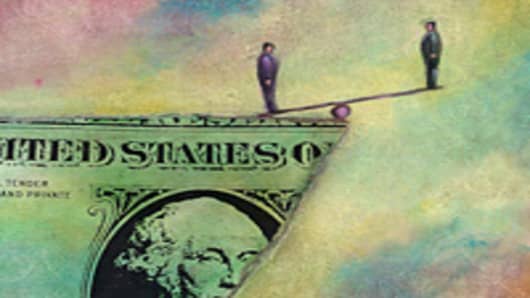"Fiscal cliff" is a term you'll be hearing much more often between now and the end of the year. That's when a half-trillion dollars worth of tax cuts and spending boosts go by the wayside, possibly dragging the U.S. economy into the abyss of another recession.
That, however, is the worst-case scenario.
A more likely outcome, according to those who have studied the issue closely, is that Washington officials come up with a way to extend many of the items in question before automatic tax increases and spending cuts kick in that could choke the life out of the already-stumbling recovery.
Global policy makers have done it during the financial crisis of 2008, the U.S. budget imbroglio in 2011, and throughout the European sovereign debt disaster.
For the fiscal cliff, there are four main items at issue: Expiration of the Bush tax cuts; the end of the 2 percent payroll tax holiday; extended unemployment compensationcoming to a close; and the automatic spending and budget cuts mandated by the Budget Control Act if Congress fails to reach its Supercommittee's deficit reduction goals.
All told, the damage would amount to $500 billion, or some 3.8 percent of gross domestic product , at a time when GDP is struggling to grow by 2 percent.
While it all sounds pretty scary on the surface, in practice it's unlikely that anyone in Washington will be content to sit by and allow another deep recession to hit.
"We do not see the doomsday scenario playing out: policymakers are unlikely to drive the US economy off the fiscal cliff," JPMorgan Chase economist Michael Feroli said in an analysis. "Nonetheless, fiscal policy will continue to be a drag on the economy next year."
For a firm that does not believe the worst of the cliff scenario will come to pass, JPM has done extensive analysis of its ramifications.
The conclusion: While the markets may rattle and roll over the doomsday scenarios, the end result will be a buying opportunity.
"We anticipate the market will show a smaller-amplitude reaction to the political drama developing around the US fiscal cliff," said Thomas J. Lee, JPMorgan's chief market strategist. "The fiscal cliff is enormous...but there is sufficient common ground to expect much of this to be delayed."
In other words, policymakers soon will embark on another round of their favorite sport: Can-kicking problems as far down the road as possible (if you'll pardon the overused market cliche).
"In 2012, the fiscal cliff carries major economic consequences...but (is) unlikely to trigger a financial crisis," Lee said. "Of course, we ultimately expect some form of 'can kicking' but even if this comes down to the final week of December before action, we expect markets to become more comfortable with the notion this is not a financial crisis ala 2011.
Ah yes, 2011.
That was the year the U.S. confronted the danger of defaulting on its cascading debts, a situation that ultimately led Standard & Poor's to downgrade American debtfor the first time in the nation's history.
"Investors are at the front-end of thinking about the fiscal cliff as well as the turmoil in Europe and thus, naturally, caution about the next two quarters is building," Lee said. "We also know that the crisis was only buyable last year when we saw the 'whites of the eyes' of resolution and thus, the logical choice is to be cautious.
Yeah, But Can We Still Make Money?
Lee sees investors efforts trying to front-run — and sell into — a bad outcome for the Washington negotiations. That, in turn, will offer a dip-buying opportunity, with specific focus on financials and cyclicals. He also expects energy to outperform as it often does following consecutive quarters of strong stock market gains.
Some of JPMorgan's top choices for individual stocks: Pioneer Natural Resources , Air Lease Corp, Denbury, Embraier and Berry Petroleum.
Other experts are a bit less sanguine about the outcome, even though the consensus belief is that the U.S. is unlikely to tumble off the cliff all at once.
"If politicians continue to dither, investors should view the fiscal cliff as a major economic and political threat to growth, and one that would warrant a higher risk premium in the valuations of equities, high yield bonds and other risk assets," Pimco's Mohamed El-Erian said in an email response to a question about the fiscal cliff.
Michael Yoshikami, CEO and founder of Destination Wealth Management in San Francisco, thinks investors ought to gravitate to dividend-paying stocks to protect cash flow, with a focus on technology and consumer staples — essentially "higher-growth assets or assets that do well in a more austere environment."
"Despite the problems, the United States is still one of the bright spots of the world," he said. "It's just a matter of growth slowing, and if in fact growth is slowing you need to reposition differently."
James Paulsen, chief market strategist at Wells Capital Management in Minneapolis, said that whatever the Washington negotiationsproduce, investors should count on getting less stimulative help from the government.
"We're experiencing the fiscal cliff already, it's just in infinitesimally small ways, eating away at us every day," said Paulsen, who advocates not only buying dips but also selling into strength in what he expects to be a volatile environment where the S&P 500 finishes the year at 1,500, despite all the turbulence.
For Randy Frederick, director of trading and derivatives at Charles Schwab, a likely market pullback over the summer brings with it a chance to employ options strategies like covered calls and collars, both of which attempt limit downside.
"When you talk about a fiscal cliff...it's probably a little early to worry about those issues," he said. "But we are due for a pullback for a number of different reasons."
Questions? Comments? Email us at NetNet@cnbc.com
Follow Jeff @ twitter.com/JeffCoxCNBCcom
Follow NetNet on Twitter @ twitter.com/CNBCnetnet
Facebook us @ www.facebook.com/NetNetCNBC




